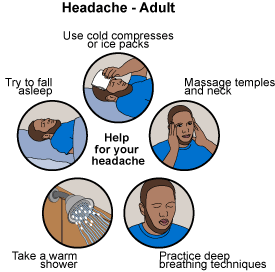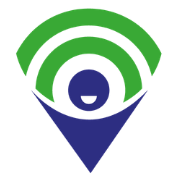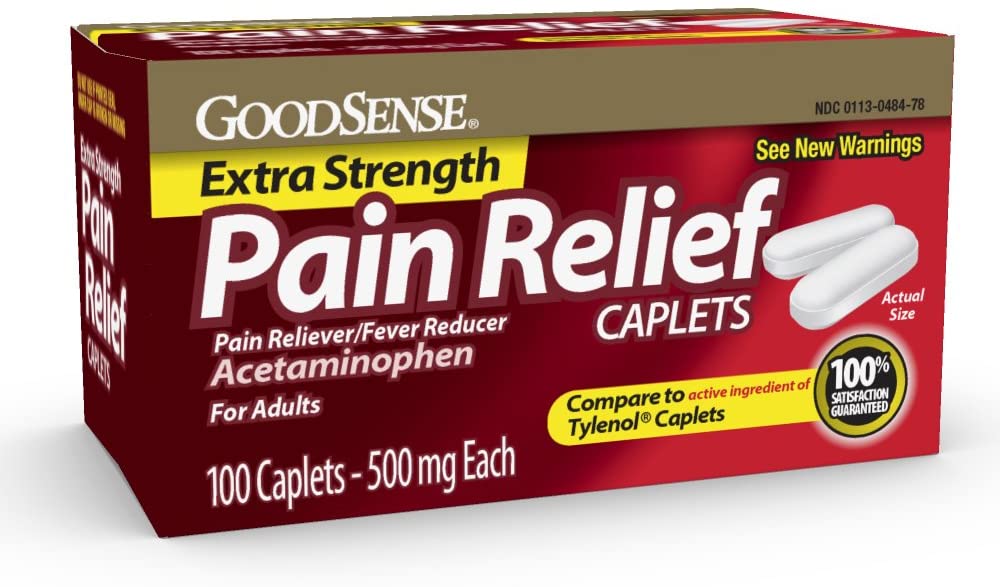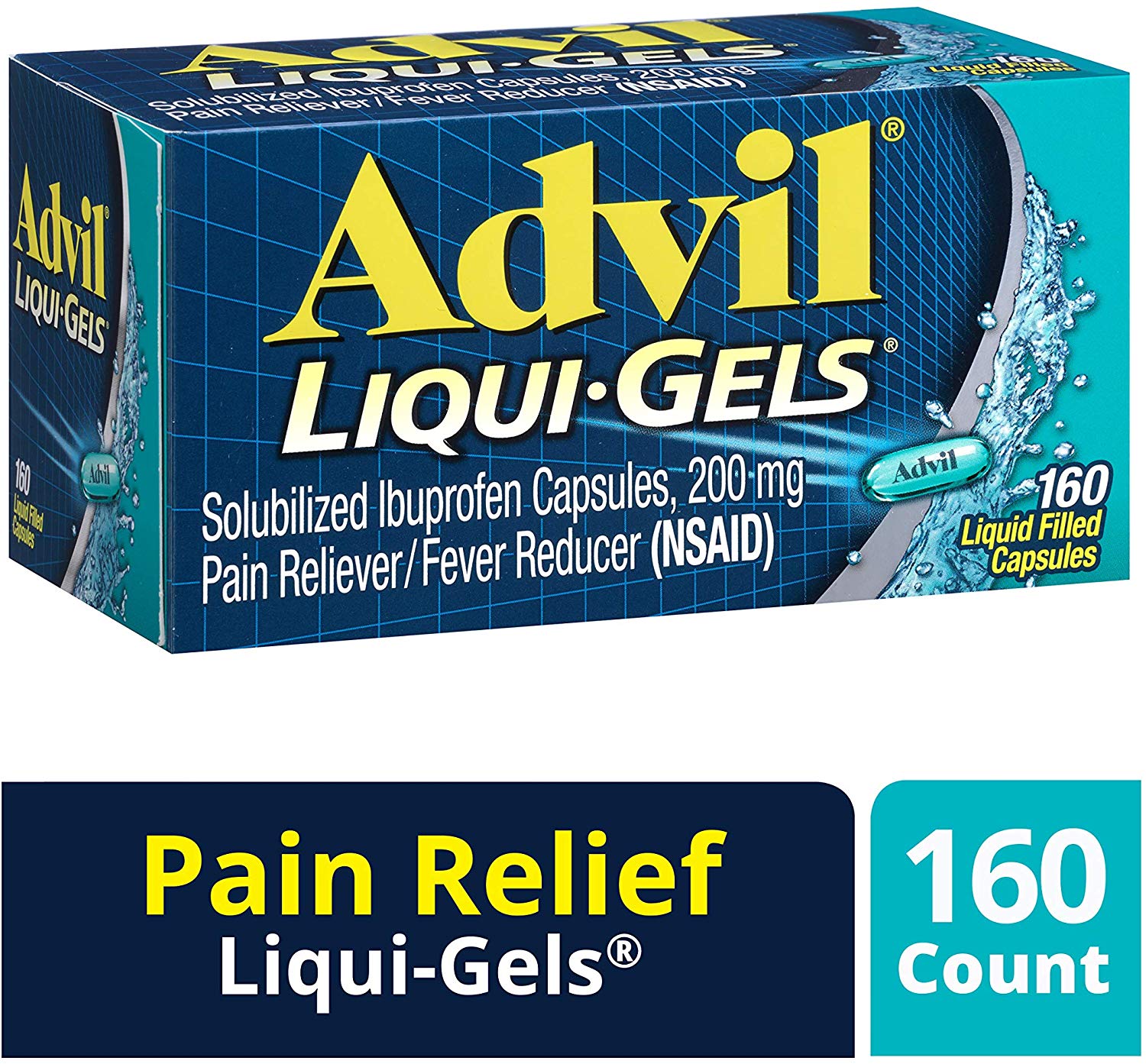Headache
Overview
Headache is the word used to describe aching or pain in the head. There are many types of headaches. Some of them are:
Headaches that are from an illness or injury. These may be caused from a virus or other infection. They can also happen when you do not get enough to drink.
Tension headaches are not often bad enough to keep you from doing daily activities. You may feel tightness in the muscles around the head, neck, and shoulders.
Migraine headaches often start off mild and get worse. You are often not able to do normal activities. This kind of headache may also have other signs with it like throwing up and making it hard to be around light and sounds.
Cluster headaches happen again and again. The pain is burning, sharp, and keeps hurting. The pain may happen behind or around your eye. It can also be on one side of your face. Signs can include a stuffed, runny nose and red, watery eyes. They can happen because of smoking, heat, and bright lights. Some drugs can also cause this type of headache.
A sinus headache is often thought to be a migraine. The pain is dull and throbbing. The pain happens behind the nose, eyes, forehead, and cheekbones. This is often due to swelling of the sinuses (sinusitis). If you have a fever and greenish yellow thick liquid from your nose, you may have a sinus headache
Not all headaches need to be checked by a doctor. Some kinds may be a sign of a serious problem. Care for headaches will depend on what is causing them.
The exact cause of many headaches is not known and may be different for each kind of headache.
Signs are different for each kind of headache. Talk with your doctor about your signs.
Your doctor will take your history and do an exam. You will be asked to talk about your headaches. The doctor will want to know when they happen and how often you get them. It may be hard to find the exact cause. Your doctor may order:
Lab tests
CT or MRI scan
Other tests to check for health problems that could be causing the headaches
Goals are to stop or lower the number of headaches, help ease your pain, and give you a better quality of life. The type of care that is best for you will depend on the type of headache you have. This may be:
Self-care during the headache:
Cold compresses or ice packs
Massaging temples and neck
Deep breathing techniques
Warm shower
Sleeping
Drugs that don’t need to be ordered by a doctor like acetaminophen or ibuprofen

Other care may be:
Acupuncture
Physical therapy
Massage if the pain is in the neck and shoulders
Botox
Some things can lessen the chance for you to get a headache. Make sure you:
Go to sleep and get up at the same time each day and get enough sleep.
Do not miss meals.
Exercise often. Drink lots of fluids, especially in hot weather.
Do not drink beer, wine, and mixed drinks (alcohol).
Practice ways to lower your stress. Learn and practice ways to cope.
Avoid foods that might cause your headaches.
Stop smoking if you smoke.
Write down things about your headaches, like when they happen, what causes them, and what helps them.
Your doctor may order drugs based on the type of headache you have. The doctor may order drugs to:
Help with pain
Prevent or stop the headache
Treat upset stomach and throwing up
Treat high blood pressure
Treat low mood
Treat hormonal imbalance
Headache may be part of a more serious health problem.
Know the things that may start your headache.
Don’t spend too much time in front of screens. This includes watching TV, using computers, and playing video games.
Take drugs to keep from getting headaches. Your doctor may give you drugs to lower how long the headache lasts. This can also help lower how long you will have your headache.
Hold the phone rather than resting it on your shoulder, or use a headset.
Usual Adult Dose for Fever
Oral:
Immediate-release: 325 mg to 1 g orally every 4 to 6 hours
Extra strength (500 mg/tablet): 2 tablets (1 g) every 6 hours as needed; maximum daily dose: 6 tablets/day (3 g/day).
Comments:
-Maximum daily dose is based on all routes of administration and all products containing acetaminophen.
-Maximum daily dose and dosing recommendations may differ by product; some manufacturers have decreased the maximum daily dose to protect consumers from inadvertent overdoses.
Uses:
-For the management of mild to moderate pain and the management of moderate to severe pain with adjunctive opioid analgesics.
-For the reduction of fever.
Usual Adult Dose for Fever
Oral:
Initial dose: 200 mg orally every 4 to 6 hours
-May increase to 400 mg every 4 to 6 hours if needed
Maximum dose: 1200 mg/day
Comments:
-Use the lowest effective dosage for the shortest duration consistent with individual patient treatment goals.
-Patients should be well hydrated to reduce the risk of renal adverse events.
-IV doses should be infused over at least 30 minutes.



